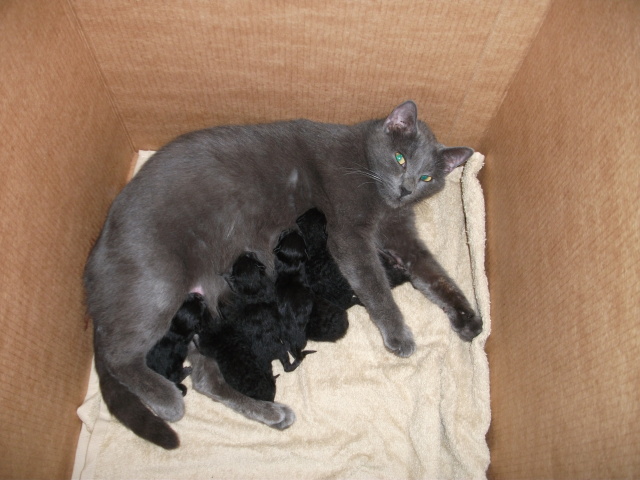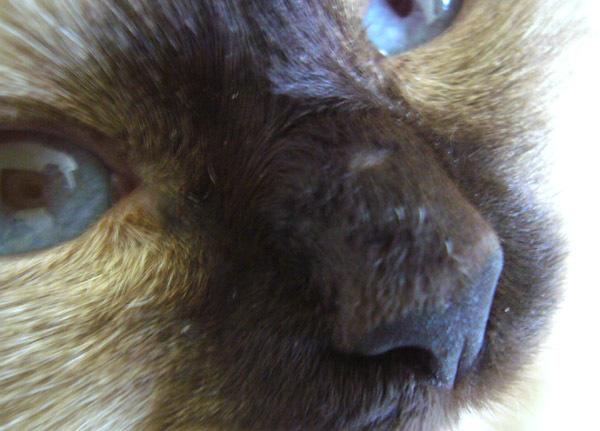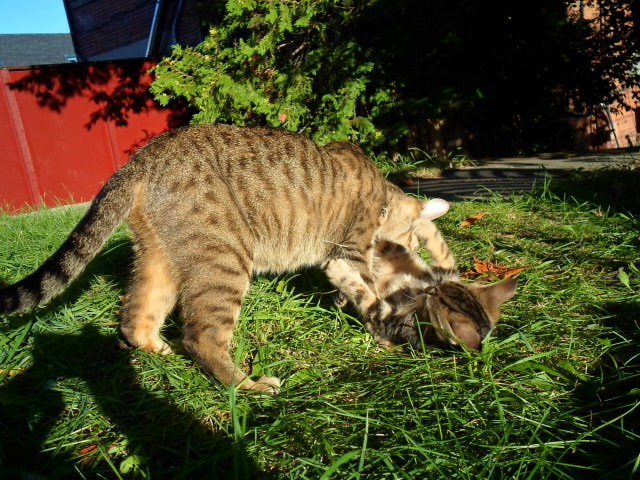QuestionHello! My name is stacy and I am fostering 2 weeks old kittens. I had them
since they were 3 days old. Some lady dropped them off at the humane
society because their mother never came back and they started dieing off.
Well now that they are 2 weeks old, they are starting to just die. I have
fostered kittens this young before and they have lived. So it's not like I'm
doing any thing different from before. But this litter is just weird! They are
perfectly healthy one minute and then out of no where they will scream for an
hour and that's it. They die! I don't know what's going on. Now there is only
one left. Do you think it could be fiv/fip/felv? If so, am I putting my other cats
in danger by having them here? I don't know what I should do because now
I'm freaking out bout my own cats health.
AnswerHi Stacy. These kittens are really too young for FIP, FIV or FeLV to be the likely problem. FIP is generally contracted through shared use of a litter box, so you can almost certainly rule that out. FeLV can be spread through breast feeding, but these kittens didn't nurse very long, and the disease usually takes at least a few months to kill. That wouldn't be too high on my suspicion list, either. FIV is extremely rarely passed from mother to kittens, and again, does not generally kill so quickly. And as long as your cats do not have direct contact with these babies and your cats are up-to-date on their standard vaccines (FeLV/FIV ARE NOT NECESSARY), they do not pose a risk to your other kitties. Leukemia is only spread through prolonged direct contact such as mutual grooming or sharing food and water, or a bite wound, and FIV is only spread through bite wounds.
My fear is that these little ones may have had an active distemper infection. The incubation period for this germ can be up to 2 weeks before any symptoms arise. The feline distemper virus is absolutely everywhere - in the soil, in the air, even in households. And if these little ones went into the humane society, you can almost guarantee they were exposed. At 3 days old, they had no immune system to fight the germ off at all.
Distemper kills because it lowers the kitten's white blood cell count. This allows other infections to come in, which are ultimately the cause of death. The ideal treatment is to put the kitty on IV antibiotics. In such a little one, this is not possible. However, just like you, I had a two-week-old kitten with distemper. I brought him to the hospital, unconscious, stiff and cold. They told me, "I really don't think we're going to have a miracle here." But I asked them to try, and they brought his lifeless body away in a shoe box. They gave him fluids under his skin, instead of into his veins, because his veins where too tiny. This contained sugars to fight hypoglycemia, electrolytes to fight dehydration, and an antibiotic. They kept him on a heating pad, since end-stage distemper lowers body temperature. And when I visited him that night, he was walking! The vets warned me that we were not out of the vets, but he went home in a couple days. It took him a couple weeks to recover fully, but he is now 12 years old!
There are certainly other infections that could be to blame, or it may even be a congenital problem that is just manifesting now. Distemper is just about the worst case scenario, but it is the number one killer of unvaccinated cats. I think getting to a vet is the first step. In any case, I think an antibiotic would definitely be warranted. Nobody knows what causes Fading Kitten Syndrome, but my experience has been that antibiotics NEVER hurt. In my experience, those kittens which receive them fare better than those which don't every time.
As for your other cats, if they're not up on their distemper vaccines, have this done, and be sure to disinfect your hands as often as possible. Despite the recommendation to vaccinate yearly, the distemper vaccine probably lasts for at least 4 years, and some believe it provides lifetime protection. But since no studies have been conducted to determine the exact length of protection, you should make sure they're up-to-date, just in case this does happen to be distemper.

 Litter of 9 kittens, born 2/05/10
Question
Smoke and babies
Although we have had 2 adult
Litter of 9 kittens, born 2/05/10
Question
Smoke and babies
Although we have had 2 adult
 Bald spot on my cats nose
Question
bald spot
Hello Jessica,
Today I notic
Bald spot on my cats nose
Question
bald spot
Hello Jessica,
Today I notic
 tatty kitten
QuestionQUESTION: Hi i have adopted a bengal kitt
tatty kitten
QuestionQUESTION: Hi i have adopted a bengal kitt
 Cat Breed Identification?
Question
Playtime Pretty Girl
Hi there. &n
Cat Breed Identification?
Question
Playtime Pretty Girl
Hi there. &n
 Reclusive kitten
QuestionMy cousin found an abandoned kitten and where s
Reclusive kitten
QuestionMy cousin found an abandoned kitten and where s